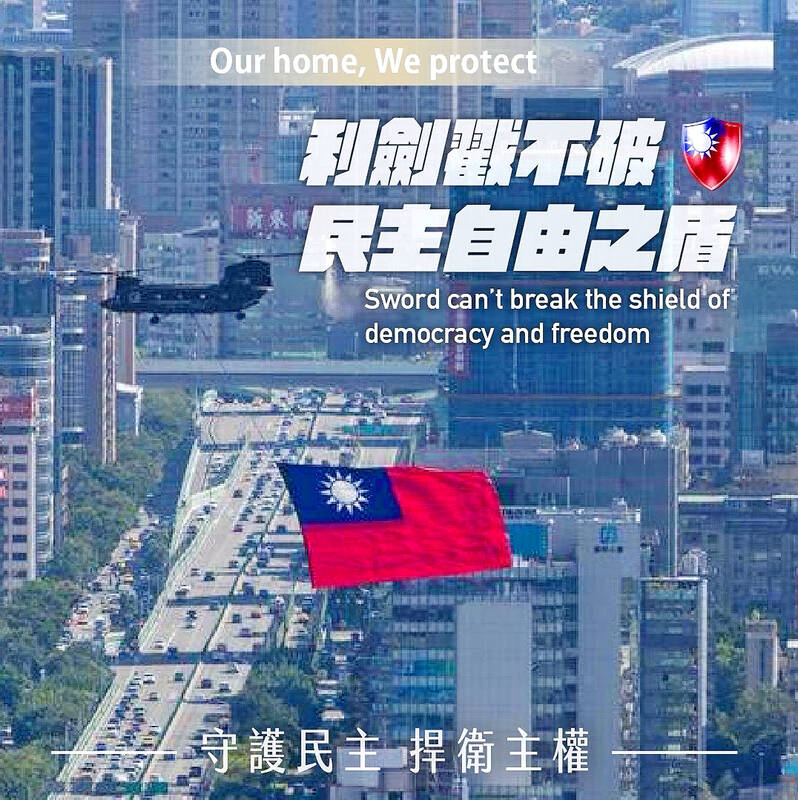Countries that would get involved in a Taiwan-China conflict should take steps to counter Beijing’s propaganda which says that China would not be defeated, a US military official wrote in a research paper.
Chinese propaganda on social media, along with the expansion of its military, is intended to convey the message to countries friendly to Taiwan that they could not defeat China in a conflict, and therefore should not become involved, US Marine Corps Lieutenant Colonel Brian Kerg wrote.
Kerg, who wrote the paper for the Atlantic Council’s Scowcroft Center for Strategy and Security where he is a research fellow, said that China observers should see Beijing’s “Joint Sword-2024A” military exercises held last month from that perspective.

Photo courtesy of the Ministry of National Defense
China would have policymakers in the US and elsewhere believe that resistance to a Chinese occupation of Taiwan would be futile, and therefore they should seek to encourage Taiwan to accept “peaceful unification,” he said.
Analysis of the Chinese People’s Liberation Army shows that although China is a military threat, it is not as big of a threat as Beijing would have people believe through its propaganda, he said.
However, if Beijing influence campaigns helps to reinforce beliefs about its power, then China would achieve its aims without the need to engage in military conflict, he said.
To prevent that from happening, policymakers and analysts should understand the nature and depth of Beijing’s influence campaign, and be aware of its relative vulnerability in the event of an attempted invasion of Taiwan, he said.
Policymakers should also work to dispel misconceptions about the strength of China’s military power, he said.
Although Beijing likely has the air and sea capabilities to blockade Taiwan, maintaining the blockade might also be strategically detrimental to Beijing and would damage China’s economy, he said, adding that a complete and long-term blockade would put great pressure on China’s military.
An amphibious assault on Taiwan would be larger in scale and more complex than the Normandy landings during World War II, and would require joint planning and coordination on a level that the various branches of the People’s Liberation Army lack the capability for, he said.
Countering China’s narrative must be pre-emptive, and policymakers must emphasize China’s vulnerabilities, so as to strengthen public support for assisting Taiwan’s defense, he said.
The resilience of US alliances and partnerships against Chinese aggression must be demonstrated, as well as the efforts to improve the effectiveness of Taiwan’s overall defense, he added.
The Taiwanese government should also make efforts to protect its public from the influence of disinformation, for example by teaching media literacy skills in schools, he said.

Taiwan is to commence mass production of the Tien Kung (天弓, “Sky Bow”) III, IV and V missiles by the second quarter of this year if the legislature approves the government’s NT$1.25 trillion (US$39.78 billion) special defense budget, an official said yesterday. Commenting on condition of anonymity, a defense official with knowledge of the matter said that the advanced systems are expected to provide crucial capabilities against ballistic and cruise missiles for the proposed “T-Dome,” an advanced, multi-layered air defense network. The Tien Kung III is an air defense missile with a maximum interception altitude of 35km. The Tien Kung IV and V

The disruption of 941 flights in and out of Taiwan due to China’s large-scale military exercises was no accident, but rather the result of a “quasi-blockade” used to simulate creating the air and sea routes needed for an amphibious landing, a military expert said. The disruptions occurred on Tuesday and lasted about 10 hours as China conducted live-fire drills in the Taiwan Strait. The Civil Aviation Administration (CAA) said the exercises affected 857 international flights and 84 domestic flights, affecting more than 100,000 travelers. Su Tzu-yun (蘇紫雲), a research fellow at the government-sponsored Institute for National Defense and Security Research, said the air

Taiwan lacks effective and cost-efficient armaments to intercept rockets, making the planned “T-Dome” interception system necessary, two experts said on Tuesday. The concerns were raised after China’s military fired two waves of rockets during live-fire drills around Taiwan on Tuesday, part of two-day exercises code-named “Justice Mission 2025.” The first wave involved 17 rockets launched at 9am from Pingtan in China’s Fujian Province, according to Lieutenant General Hsieh Jih-sheng (謝日升) of the Office of the Deputy Chief of the General Staff for Intelligence at the Ministry of National Defense. Those rockets landed 70 nautical miles (129.6km) northeast of Keelung without flying over Taiwan,

City buses in Taipei and New Taipei City, as well as the Taipei MRT, would on Saturday begin accepting QR code payments from five electronic payment providers, the Taipei Department of Transportation said yesterday. The new option would allow passengers to use the “transportation QR code” feature from EasyWallet, iPass Money, iCash Pay, Jkopay or PXPay Plus. Passengers should open their preferred electronic payment app, select the “transportation code” — not the regular payment code — unlock it, and scan the code at ticket readers or gates, General Planning Division Director-General Liu Kuo-chu (劉國著) said. People should move through the